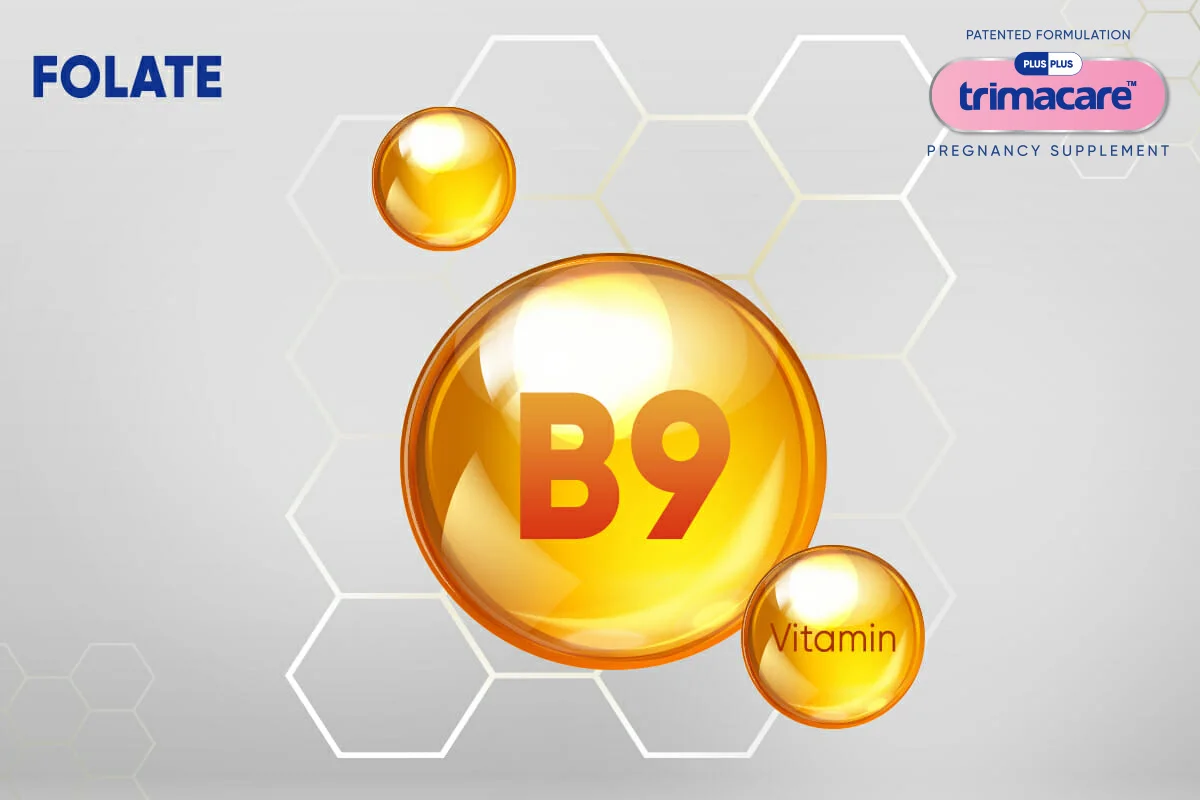Folate (also known as folic acid) is a type of Vitamin B that promotes normal growth and development. Multiple foods naturally contain folate, often known as vitamin B9. To produce DNA and other genetic material and cell division, the body needs folate. Therefore, intake of best folic acid for pregnancy is most important during the first trimester.
Folic acid for pregnancy is consumed both as a dietary supplement and in sources food. It is essential for foetal development, particularly during the first trimester of pregnancy. Folate needed for cell division and essential for the formation and maintenance of DNA and other genetic material. Micronutrients boost the health of the mother throughout pregnancy and ensure long-term advantages for both mother and child. They help in proper foetal development, including the development of the brain, heart, nervous system, blood, and other organs.
What is better, Folate or Folic Acid?
The major difference between Folate and Folic Acid is that Folate is a natural form of Vitamin B9 which is metabolically active, and Folic Acid is the synthesised form. Since Folate and Folic Acid have a similar molecular structure, they are often accepted as the same, but they are different.
As per a study by Reviews in Obstetrics and Gynaecology, around 40-60% of our population has the genetic polymorphism in MTHFR and thus they aren’t able to convert Folic Acid into L-methylfolate resulting in Folate deficiency. MTHFR (Methylenetetrahydrofolate reductase) is the enzyme which facilitates the overall conversion process. But due to the genetic mutation, a part of the population (as mentioned above) can’t convert Folic Acid into Folate by themselves. The process below simply explains how the conversion takes place:
MTHFR gene plays a role in instructing the body to secrete an enzyme which initiates the conversion of Folic Acid to L-methylfolate (active form). If there is a genetic mutation, a person loses the ability to convert folic acid into active form. Folic Acid must pass through four steps of conversion before it reaches the final active form and depends on several other factors such as nutrients and genetics to get converted effectively.
Therefore, if a pregnant lady consumes L-methylfolate in place of Folic Acid, even if, she has a genetic polymorphism in MTHFR, she is still able to convert it into Folate. Replacing Folic Acid with L-methylfolate bypasses the genetic mutation (defected enzyme) and leads to the active form of Folate directly.
The medical fraternity believes that supplementing with Folate (in L-methylfolate form) in place of Folic Acid is better, and safer in pregnancy. Another benefit of L-methylfolate is that it is an active form and 7 times more bioavailable form of Folic Acid.
What are the advantages of consuming Folate during pregnancy?
The requirement of Folate increases during pregnancy as the foetus grows rapidly and the demand for nutrition increases. The foetus requires Folate particularly during the first trimester where neural tube development takes place. Folate is essential for the proper functioning the baby’s neural tube , and it reduces low birth weight risk and prevents premature birth risk.
- Spina bifida: defective spinal cord or the vertebrae
- Anencephaly: defective major parts of the brain
If a baby has anencephaly, they may not live a long life and those afflicted with spina bifida may be permanently disabled. These are severe health complications, and to prevent them, it is essential to consume enough Folate to shield the baby from neural tube defects. If a pregnant woman has already given birth to a baby with such complications, getting enough Folic Acid for neural tube may diminish the risk of having another child with the defect.
Folic acid during pregnancy also facilitates the conversion of homocysteine to Methionine (essential amino acid). If the body has higher levels of homocysteine, there are chances of recurrent miscarriages and infertility. A person can have megaloblastic anaemia in conditions of Folate deficiency.
Importance of Folate for babies
Consuming Folate may safeguard the baby against:
✓ Cleft lip and palate
✓ Adequate folic acid consumption may prevent premature birth risk.
✓ Folic acid tablet during pregnancy enhances the chances low birth weight
✓ Miscarriage
✓ Poor growth in the womb
Importance of Folate for pregnant women
A pregnant lady is recommended to take Folate every day as it reduces the chances of the followings:
✓ Pregnancy complications
✓ Heart disease
✓ Stroke
✓ Some types of cancers
✓ Alzheimer’s disease
What if a pregnant woman has Folate deficiency during pregnancy?
As mentioned above, a typical Indian diet is rich in carbohydrates but lacks crucial micronutrients.
There are several reasons other than a Folate-deficient diet due to which the deficiency can occur. Check below:
- Diseases in which the digestive system fails to absorb this nutrient (Celiac disease)
- Too much alcohol consumption
- Overcooking vegetables as heat can easily destroy Folate
- Haemolytic anaemia
- Genetic mutation where Folate conversion is restricted
- Kidney related conditions where dialysis is required
Effects of Folate deficiency on a growing baby
There is a direct connection between the normal development of the brain and the diet. Deficiency in nutrition leads to adverse effects on the motor and cognitive functioning of the growing baby. Folate deficiency is known to have teratogenic effects. Neural tube defect is one of the major complications that arise due to Folate deficiency. Folic Acid for neural tube reduces the chances of getting neural tube defects are reduced, and reduces the chances of cleft lip & palate, cardiovascular malformation (CVM), limb reductions, urogenital abnormalities, etc.
Deficiency of Folate during the pre-conception period imposes several growth and developmental issues including both short terms and long term. Inadequate levels of folate and cyanocobalamin can increase the risk of long-term depression in adults.
Effects of Folate deficiency on a pregnant woman
The nutritional requirement of Folate increases during pregnancy as the mother-to-be is required to have an adequate amount of Folate to carry out the foetal development functions as well as the growth of maternal tissues. Deficiency of Folate can lead to megaloblastic anaemia. If not treated well, this type of anaemia is fatal.
Maternal serum and RBC concentration of Folate start to fall due to several reasons including inadequate intake of Folate, reduced absorption, rise in the catabolism of Folate, increase in intravascular volume, etc. Inadequate intake of Folate, restricted Folate absorption, and cooking practices are some reasons for Folate deficiencies in many women who are either pregnant or trying to conceive.
When should a pregnant woman take a Folate supplement?
If you consulted your doctor when you were trying to conceive, chances are they told you to start taking a prenatal supplement of Folate.
Folate supplementation is mandatory during the first trimester of pregnancy as during the initial stages, the baby’s brain and spinal cord are developing, and birth defects can most commonly occur within the first 3-4 weeks of pregnancy.
A lower dose of Folate is recommended for the second and third trimester as well, for overall benefits to mother & child.
How much Folate is a pregnant woman required to supplement?
ICMR (Indian Council of Medical Research) recommends 0.5 mg (or 500 mcg) of Folate/day for all women of childbearing age. Ideally, this should be consumed via a healthy diet of green leafy vegetables.
However, if you are pregnant, Indian gynaecologists will recommend you to have 5 Mg of Folate in the first trimester and continue with the daily dose of 0.5 mg (or 500 Mcg) in the second & third trimester. This is because most Indian women are Folate-deficient, and your gynaecologist will not take chances with the development of your baby. You cannot over-dose with Folate as it is a water-soluble vitamin which means the body won’t store it in its fat tissues. After metabolism, the amount which is leftover is flushed out of the body through urine.
Can a pregnant woman take an international prenatal pill during pregnancy?
Most of the international prenatal pills contain only 400 mcg of Folate. This amount is set based on the guidelines of that particular country. We need to understand that these factors differ from place to place. The amount of Folate a pregnant lady needs in the UK, or the US differs from India. Thus, taking any international prenatal pill is fine but it won’t supplement adequately to the nutritional requirement of an Indian pregnant woman. The Indian pregnant woman may have to take a higher dose of Folate along with the international brand of prenatal.
How can a pregnant woman increase Folate intake through diet?
A naturally occurring Vitamin B form, the name ‘Folate’ is taken from ‘folium’ which is a Latin word for leaf. Additionally, Folate is most abundantly found in leafy vegetables. Some commonly available sources are:
- Legumes
- Leafy greens
- Eggs
- Beetroots
- Wheat germ
- Avocado
- Banana
- Papaya
- Nuts & seeds
- Citrus fruits
- Broccoli
- Soya
- Spinach
- Pomegranate
A dual approach of diet and prenatal supplement is highly recommended for every pregnant woman, not only to satisfy her own nutritional requirements but also to fulfil the nutritional requirements of her baby. If you are a pregnant woman or trying to conceive, always remember that Folate has both short-term and long-term benefits.
Which is the Folic Acid tablets available for Indian pregnant women?
Choosing the right pregnancy multivitamins with best folic acid for pregnancy is a difficult task. Trimacare pregnancy vitamin tablet by PlusPlus Lifesciences LLP is designed and formulated by a team of doctors, pharmacologists, and nutritionists following the guidelines of WHO and ICMR. Trimacare prenatal multivitamin comes in 3 different packs for each trimester, as the pregnancy needs are unique in each trimester, and it provides all the 20+ nutrients required by a pregnant woman and her child holistically and to supplement the needs perfectly.
TrimacareTM 1 prenatal tablet contains 5 mg Folate (in L-methyl folate form) which is recommended by the leading gynaecologists of India. Trimacare pregnancy vitamin supplement has L-methyl folate which an advanced form and is 7 times more bioavailable form of Folic Acid.
TrimacareTM 2 women’s prenatal vitamin & Trimacare 3 multivitamin tablets for women contain 0.5 mg Folate along with 20+ essential nutrients. Trimacare best multivitamin for pregnancy provides 100% Required Daily Allowances (RDA) of Folate in case there continues to remain any gaps in diet.
Trimacare pregnancy multivitamin for women can be introduced at any stage of pregnancy. It is a one stop solution which supplements all the micronutrient needs of pregnancy. Hence, there is no need to take multiple pills every day for different nutrients. Trimacare prenatal pill is made with natural, plant-based ingredients thus it is safe and chemical-free.
Trimacare prenatal vitamins with folic acid is recommended by leading doctors of India. This pregnancy supplement with Folic acid is available both online (Amazon, 1mg, Flipkart) and offline at your nearest chemist.












